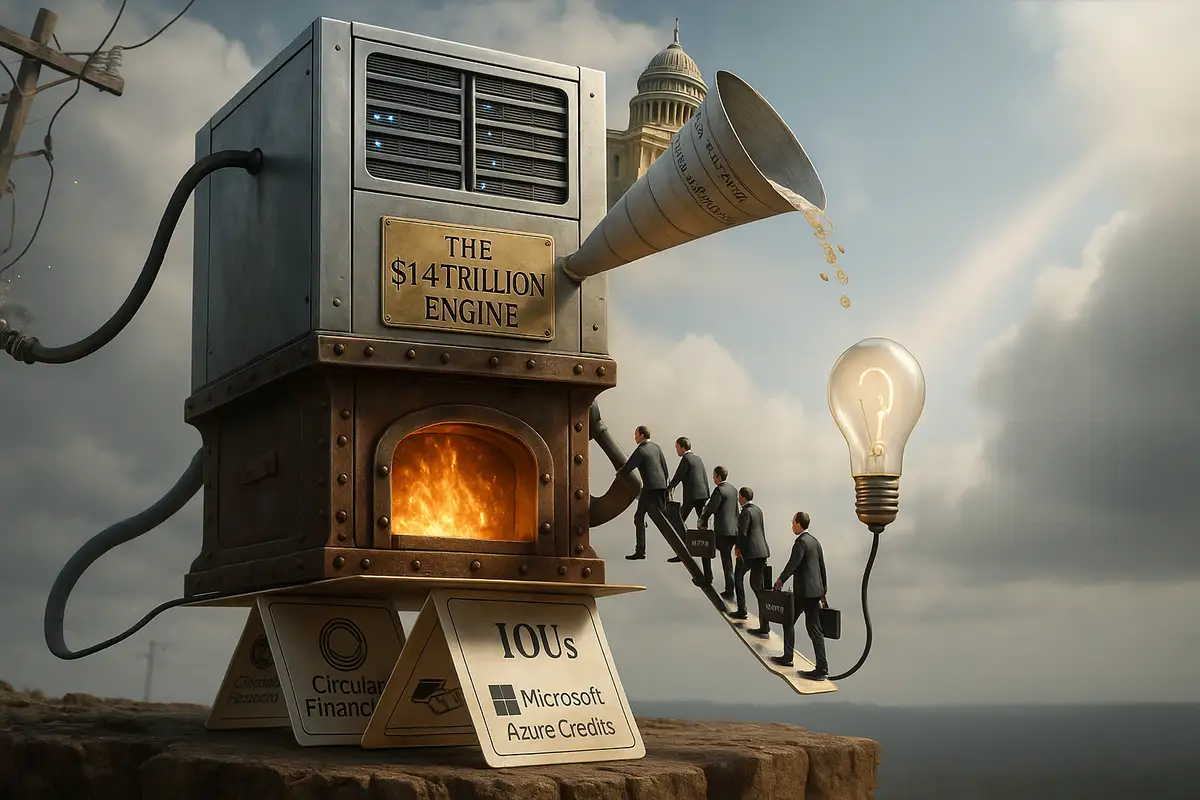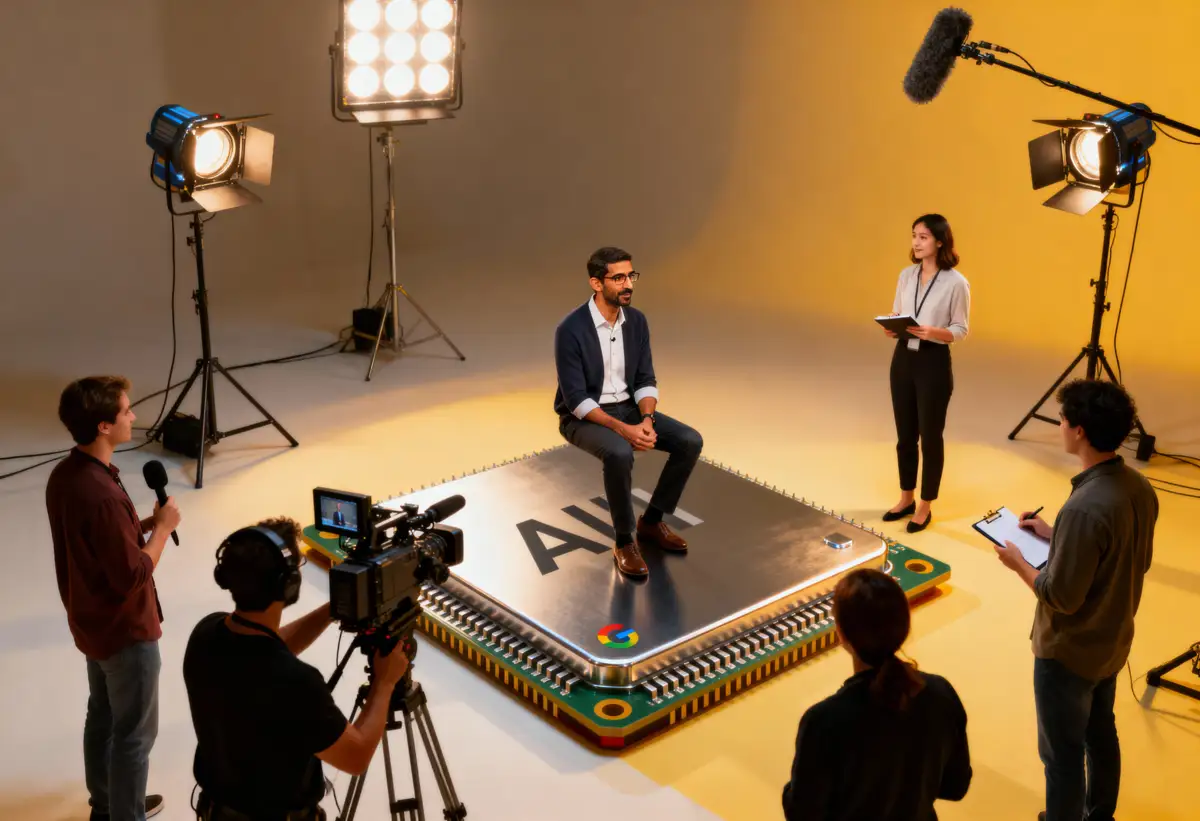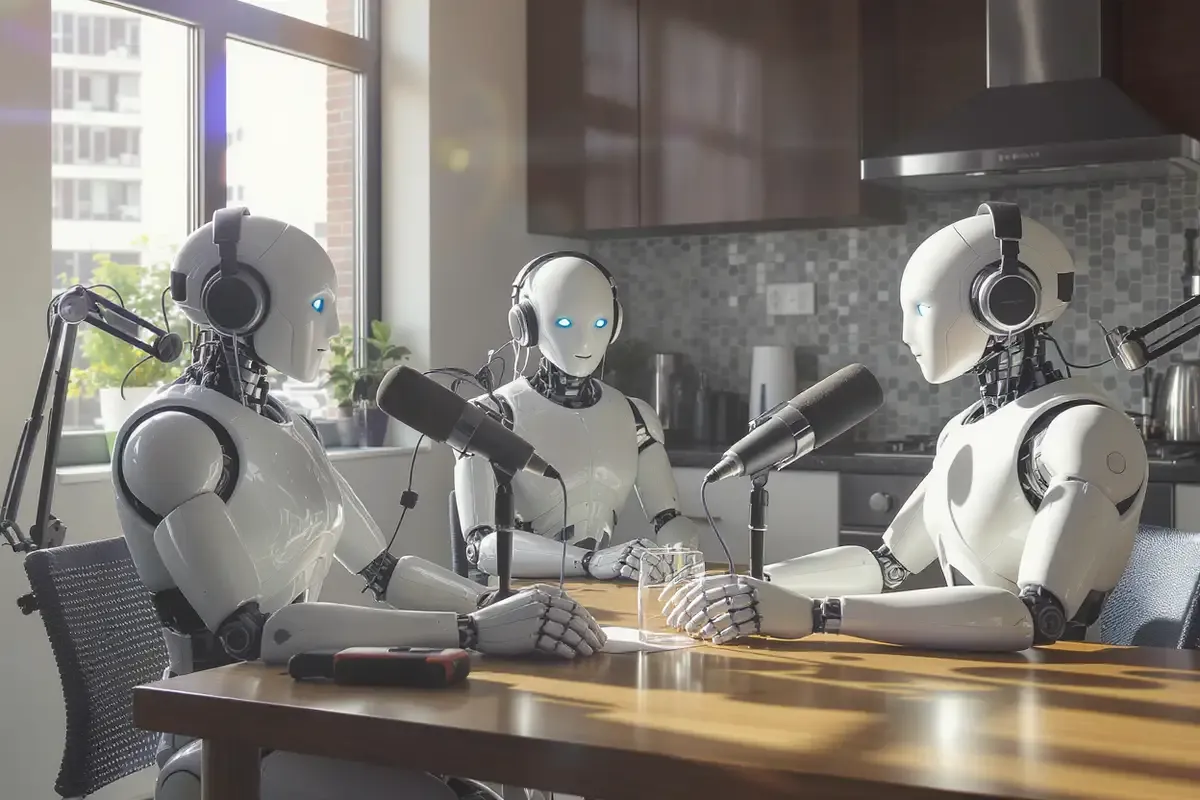Eight employees. Three thousand episodes per week. One dollar per episode. Twenty listeners to break even.
Inception Point AI doesn't make podcasts the way most people understand the term. The Venice, California startup runs an industrial operation that treats audio like inventory, not art. Its Quiet Please Podcast Network now carries over 5,000 shows with more than 175,000 total episodes flooding Spotify, Apple Podcasts and every other major directory. CEO Jeanine Wright, a former Wondery executive, describes a near future where "half the people on the planet will be AI." Her critics hear something different in that line. They hear capital discovering it can replace microphones with models.
The backlash arrived fast. Industry commentators called the output "slop." Podcast veterans warned about discovery algorithms drowning in synthetic content. Tech press coverage oscillated between fascination with the unit economics and horror at the implications. What gets lost in both reactions is how little this resembles traditional media strategy. Inception Point isn't trying to build the next "Serial" or compete with Joe Rogan. It's running an ad arbitrage play that happens to use audio as its medium.
Key Takeaways
• Eight employees produce 3,000 episodes weekly at $1 per episode, breaking even after just 20 listeners through programmatic ads
• Quiet Please Network has 175,000 total episodes across 5,000 shows, generating 12 million downloads with 400,000 subscribers
• Model depends on platform tolerance—directories could implement AI labeling or volume limits but currently treat synthetic shows identically to human content
• Threatens mid-tier podcasters spending $500 per episode, not prestige shows—competition shifts from craft to search coverage
The Factory Floor
Inception Point's production system strips podcasting down to its economic skeleton. A team member selects a topic. They pair it with one of roughly 120 AI personalities, from food expert Clare Delish to gardening host Nigel Thistledown. The system generates a script, renders voice synthesis, adds music, publishes to feeds. Start to finish: one hour.
Cost per episode: one dollar or less, according to case studies published by voice AI firm Hume and confirmed across multiple business outlets. The company breaks even at twenty listens because programmatic advertising runs at such granular scale. Traditional podcasts need thousands of downloads to justify production costs that run into hundreds or thousands of dollars per episode. Inception Point's model inverts that equation entirely.

The technical stack draws from roughly 184 AI agents and models working in parallel. ChatGPT, Claude, Gemini and Perplexity handle research, drafting, rewriting and fact checking. Hume's Empathic Voice Interface renders synthetic voices with what the company describes as "character, emotion and depth." The result sounds competent but flat. Listeners who sampled large chunks of the catalog describe it as "unsettling" and "a soundscape devoid of the most basic human identity."
Wright admits that quality control doesn't exist at this scale. In interviews with Podnews and other outlets, she acknowledged that early output "really sucks" and conceded there's "no way" the team can review most content before release. When controversial topics like the attempted assassination of conservative activist Charlie Kirk trend, humans step in. Otherwise the system runs autonomously. At 3,000 episodes weekly, manual review would require more staff than the company employs.
This admission matters more than it might appear. Traditional podcasters worry about every sentence, every transition, every moment of dead air. Inception Point treats those concerns as luxuries it cannot afford and does not need. If ninety percent of episodes find zero audience, the math still works. The other ten percent carry the load.
Economics That Rewrite Rules
Quiet Please reported 12 million lifetime downloads and 400,000 subscribers as of November 2025. Those numbers invite skepticism. Industry observers note that bot traffic and inflated metrics plague AI content businesses. Even accepting the figures at face value, they reveal something striking about the business model.
Twelve million downloads across 175,000 episodes works out to roughly 69 listens per episode. Far below the thousands or tens of thousands that human podcasters need to justify their time. For Inception Point, those 69 listens generate profit on content that cost a dollar to make. The gap between production cost and monetization threshold is the entire strategy.
Programmatic advertising makes this arbitrage possible. Traditional podcast ads involve host reads, sponsor relationships, negotiated rates tied to proven audience size. Programmatic systems place ads algorithmically across thousands of feeds at once, optimizing for whatever tiny audiences each episode attracts. The advertiser pays pennies. The creator gets pennies. At sufficient scale, pennies compound.
Inception Point layers additional revenue streams on top. Many Quiet Please feeds include affiliate links in show notes, driving listeners to Amazon products and tech deals. The company owns the intellectual property for its synthetic personalities and show formats, letting it repurpose scripts across short form video, audiobooks, Alexa briefings and future formats without licensing negotiations. Monetization happens in multiple directions simultaneously.
Data services estimated the company's revenue at roughly $770,000 by November 2025. For a bootstrapped operation with unsalaried employees, that represents proof of concept. Wright told business press the company will soon seek outside funding. The pitch writes itself. Low production costs. Proven monetization. A catalog that grows faster than any competitor could match.
Critics argue the model can't scale because platforms will throttle or delist synthetic shows once they recognize the problem. That bet assumes platforms care more about quality than quantity. So far evidence suggests otherwise.
The Slop Question and What It Misses
Gizmodo ran its Inception Point coverage under the headline "The Sound of Slop Is Coming." Vulture compared the operation to content farms that once filled Google search results with low value pages answering basic queries. Reddit threads and industry newsletters worry that AI podcasts will make genuine shows harder to discover as directories fill with synthetic noise.
The criticism isn't wrong. Sampling Quiet Please shows reveals exactly what critics describe: generic narratives, basic facts delivered without insight, covers that use AI generated imagery, production that sounds technically competent but emotionally vacant. A biography of Anna Wintour. Daily weather reports for dozens of cities. Pollen trackers. Cryptocurrency explainers that summarize publicly available information without analysis. This is not compelling audio.
But calling it slop misses the economic logic. Inception Point doesn't need compelling audio. It needs adequate audio at sufficient volume to capture long tail search queries. When someone types "pollen forecast Austin" or "whale migration patterns" into a podcast app, a Quiet Please feed likely appears in results. Some fraction of those searchers will listen. Some fraction will hear an ad. The system makes money on that margin.
Wright told The Hollywood Reporter that critics who dismiss AI content as slop are "lazy luddites" and that "there's a lot of really good stuff out there." Industry reaction to that quote was swift. Podcasters called it tone deaf. Media analysts pointed to the contradiction between claiming quality content and admitting most episodes aren't reviewed before release.
What Wright actually said, stripped of defensiveness, is that quality doesn't matter at her price point. Traditional podcasters compete on craft. They spend hours scripting, recording, editing. They build audiences through reputation and word of mouth. They need dedicated listeners who return week after week. Inception Point competes on coverage. It doesn't need loyal audiences. It needs search traffic.
That's the real tension. Podcasting as an art form versus podcasting as a distribution channel for programmatic ads. The two models can coexist, but only if platforms choose to distinguish between them. So far most platforms treat synthetic shows and human shows identically. They appear in the same search results, the same recommendation algorithms, the same "new releases" feeds.
Platform Tolerance: The Real Constraint
Inception Point's future hinges less on AI capabilities than on platform policy. Spotify, Apple Podcasts, Google Podcasts and other directories could implement rules tomorrow that would crater the business model. Require human host verification. Mandate AI content labeling. Throttle feeds that publish more than some threshold of episodes per week. Delist shows with abnormally low listener retention.
None of those measures exist yet. Platforms profit from content volume regardless of source. More shows mean more search queries answered, more time spent in apps, more ad inventory to sell. The platforms collect their cut whether hosts are human or synthetic.
Some early signals suggest this tolerance has limits. Industry reports describe directories experimenting with removing synthetic shows or adjusting recommendation algorithms to penalize high volume, low engagement feeds. Regulators in several jurisdictions are examining disclosure requirements for AI generated content. Consumer advocacy groups are pushing for clear labeling.
Wright acknowledges these pressures obliquely. In interviews she emphasizes that Inception Point reviews controversial content and avoids topics "that may be tricky for the AI models." That's not an editorial standard. It's risk management. The company wants to stay below whatever threshold triggers platform intervention.
The calculus changes if platforms decide synthetic shows degrade the user experience enough to warrant action. Discovery is already difficult in a podcasting ecosystem with millions of shows. Adding hundreds of thousands of AI episodes that answer search queries adequately but not well makes the problem worse. Human creators complain their work gets buried. Listeners complain they can't find quality content.
But platforms face their own pressures. Podcast advertising is projected to reach $130 billion by 2030 according to industry forecasts cited by business outlets covering Inception Point. Every show, human or synthetic, represents potential ad revenue. Platforms that aggressively filter AI content risk losing market share to platforms that don't.
This creates a race to the bottom dynamics that content moderation advocates recognize from social media. The platform that allows the most synthetic content attracts the most shows. More shows mean more search results covered. More coverage means more users finding answers to queries. More users mean more ad revenue. The platform with the strictest quality standards becomes the platform with the smallest catalog.
Inception Point doesn't need to convince platforms that synthetic hosts are good. It just needs to survive long enough that removing 175,000 episodes becomes logistically and financially painful.
The Talent Bet Nobody Asked For
Wright pitches synthetic personalities as cross platform influencers who can front podcasts, videos, books and social content. The company already lists audiobook products on Amazon credited to Inception Point AI. Clare Delish and Nigel Thistledown own their shows the way human hosts can't, IP assets that generate revenue across formats without licensing negotiations.
The strategy assumes audiences form parasocial bonds with synthetic personalities. Unlikely. Human influencers succeed through perceived authenticity, mistakes that feel genuine, bad days that break the performance. Synthetic hosts deliver controlled competence. That doesn't build loyalty.
The IP ownership moat looks equally fragile. Voice synthesis and character design are commoditizing fast. Competitors like Wondercraft and Podcastle let anyone create synthetic hosts. If Clare Delish gains traction, nothing stops Clare Savory from capturing adjacent search traffic with similar branding and voice characteristics. The defensibility Wright describes doesn't exist at the technical level.
Wright's claim that "half the people on the planet will be AI" reads like investor pitch hyperbole. What it actually predicts is normalization. Audiences stop noticing synthetic content the way they stopped noticing banner ads, until they couldn't tolerate them anymore and ad blockers became standard. Listener fatigue with AI voice patterns could follow similar dynamics. Or it might not. Consumer behavior bends toward convenience until it snaps.
What Actually Changes
The most overlooked aspect of Inception Point's model is how it redefines what podcasting is for. Human podcasters treat audio as a medium for storytelling, education, conversation. They build relationships with listeners over time. They develop distinctive voices. They create communities.
Inception Point treats audio as a vehicle for delivering programmatic ads to microtargeted search queries. The content exists to justify the ads, not the other way around. That inversion matters.
If the model succeeds, it doesn't just add synthetic shows to the ecosystem. It changes platform incentives. Why promote a human hosted show that publishes weekly and serves a niche audience when you could promote a synthetic feed that publishes daily and captures search traffic? The latter generates more ad impressions with less platform risk.
This isn't hypothetical. Other platforms are already moving in similar directions. Google is testing Audio Overviews and Daily Listen features that turn search results and news feeds into AI narrated summaries. Spotify experiments with personalized, AI hosted shows based on user listening history. Education platforms like Oboe explore AI generated course content. In each case, the logic is the same. Automate production. Maximize coverage. Monetize attention at the margins.
Human podcasters respond by arguing that quality still matters. They point to shows like "Serial," "Radiolab," "This American Life" that built massive audiences through craft. They're not wrong. Those shows do matter. They also represent a tiny fraction of total podcast consumption. Most listening happens in the long tail, people searching for basic information, light entertainment, background noise.
Inception Point doesn't threaten prestige podcasts. It threatens the middle tier. The solo host with five thousand listeners. The niche show that costs $500 per episode to produce. The local news podcast. These shows survive on modest audiences and modest revenue. They can't compete with content that costs a dollar and needs twenty listeners.
The comparison to content farms is apt but incomplete. Content farms filled Google with low quality pages and Google responded by adjusting algorithms to penalize them. That worked because Google controlled both the creation environment and the distribution platform. Podcasting is more fragmented. Dozens of apps. Multiple monetization systems. No single entity that can impose quality standards.
That fragmentation might protect human podcasters or it might accelerate their displacement. Depends on whether platforms see synthetic shows as a threat to user experience or a solution to content supply problems.
Why This Matters
For podcast platforms: Inception Point's factory model forces a policy choice that has been deferred for two years. Either implement meaningful distinctions between human and synthetic content, including labeling, discovery penalties, or volume limits, or accept that search results and recommendation algorithms will increasingly favor high volume, low quality feeds that game the system through pure coverage. The economics of programmatic advertising reward the latter. User retention metrics may eventually demand the former.
For human podcasters: The competitive landscape shifts when a single entity can produce more episodes in a week than most independent creators publish in a lifetime, at costs that make traditional production models look wasteful. The defense isn't to match volume but to own a relationship with listeners that synthetic hosts can't replicate. That requires abandoning dreams of passive discoverability and building direct audience connections through newsletters, communities, and platforms that don't treat all content as equivalent.
For advertisers: Programmatic systems already struggle with fraud, bot traffic, and placement quality. AI generated podcasts with minimal audiences and automated ad insertion create new vectors for waste. The $130 billion podcast advertising market forecast assumes human listeners who pay attention. If a significant portion of impressions come from synthetic shows finding minimal audiences, the math degrades quickly. Verification becomes the bottleneck, not reach.
❓ Frequently Asked Questions
Q: What are the 184 AI agents actually doing?
A: Inception Point runs parallel workflows using ChatGPT, Claude, Gemini and Perplexity for different tasks. Some agents research topics, others draft scripts, others rewrite for clarity, and others fact-check claims. Hume's Empathic Voice Interface handles voice synthesis with emotional inflection. The entire pipeline works autonomously, converting an idea to published audio in roughly one hour without human intervention for most episodes.
Q: Are Inception Point employees really working without salaries?
A: Yes, as of September 2025 reporting. The eight-person team operates the company on a bootstrapped basis with no disclosed venture funding. GetLatka data shows zero external funding rounds. The company generated approximately $770,000 in revenue by November 2025, and CEO Jeanine Wright told business press they plan to seek outside investors soon, which would presumably enable salaries.
Q: How does programmatic advertising work for shows with only 20 listeners?
A: Programmatic systems place ads algorithmically across thousands of feeds simultaneously, optimizing for any available audience. Inception Point partners with Triton Digital for ad placement. Even tiny audiences generate pennies per listen, but at 3,000 episodes weekly, those pennies compound. The advertiser pays for impressions regardless of audience size, and the system automatically matches ads to whatever listeners each episode attracts.
Q: Who decides which podcast topics get produced?
A: AI models scan the internet and suggest trending topics to the eight-person team. Employees review the suggestions and decide what to produce, deliberately avoiding subjects "tricky for the AI models." The company uses blunt, search-optimized titles like "Whales" or "Taylor Swift" to capture queries. For breaking news like the Charlie Kirk incident, the system detected trending searches and the team greenlit rapid production.
Q: What human review actually happens before episodes publish?
A: Almost none. Wright admitted in interviews that reviewing 3,000 weekly episodes is "physically impossible" for eight people. The team only reviews content tagged as "hard politics or hard news" before publication. For the Charlie Kirk assassination attempt, humans listened before publishing. Everything else publishes automatically. Wright acknowledged that early catalog output "really sucks" and even current episodes largely go unheard by the team before release.















